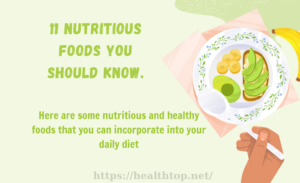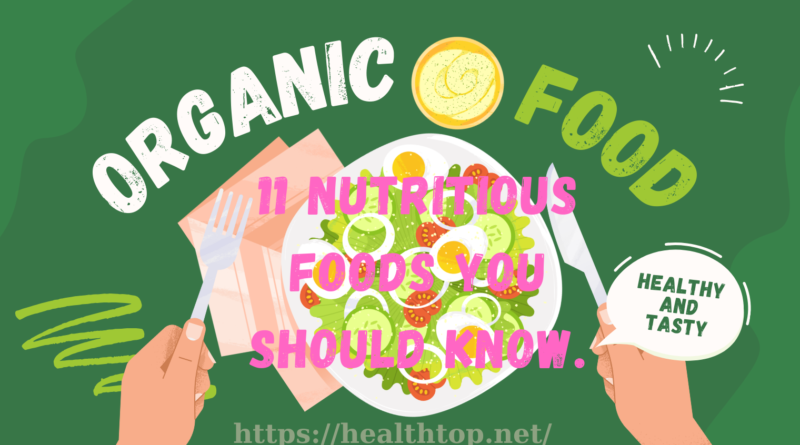11 nutritious foods you should know
Contents
11 nutritious foods you should know.
To maximize your daily nutrient intake, you should eat quality foods that are rich in nutrients. Here are some nutritious and healthy foods that you can incorporate into your daily diet:

-
Salmon
Although fish is a nutritious food, not all fish have the same nutritional value. Salmon – and other fatty fish – contain the greatest amount of omega-3 fatty acids.
Omega-3 plays an important role in maintaining optimal body functions, thereby preventing many risks of chronic diseases.
Although salmon is primarily prized for its beneficial composition of fatty acids, it also contains large amounts of other nutrients.
A 100-gram piece of wild salmon contains about 2.5 grams of omega-3s, along with plenty of high-quality animal protein and many vitamins and minerals, including large amounts of magnesium, potassium, selenium and B vitamins.
Typically, a person should eat fatty fish at least once or twice a week to get the amount of omega-3 the body needs. Studies show that people who eat fatty fish regularly have a lower risk of heart disease, dementia, depression and many other common illnesses.
Additionally, salmon tastes delicious and is quite simple to prepare and cook. It also tends to make you feel full with relatively few calories. If you can, choose wild salmon instead of farmed salmon. Wild fish are often more nutritious, have a better omega-6 to omega-3 ratio, and are less likely to contain contaminants.
How To Lose Weight at Home
-
Kale
Among all the good leafy greens, kale is known as king. This cruciferous vegetable is rich in vitamins, minerals, fiber, antioxidants and various bioactive compounds.
Vitamin C
Vitamin A
Vitamin K1
Large amounts of vitamin B6, potassium, calcium, magnesium, copper and manganese…
Kale may be even more prized than spinach. While both are very nutritious, kale is lower in oxalates, which can bind minerals like calcium in your intestines, limiting nutrient absorption.
-
Seaweed
There are thousands of different species of plants in the ocean, some of which are very nutritious. Usually, they are collectively called seaweed.
Seaweed is a common ingredient in dishes such as sushi. In many cases, seaweed is even more nutritious than vegetables. This ingredient is especially rich in minerals such as calcium, iron, magnesium and manganese.
Seaweed also includes various bioactives, including phycocyanin and carotenoids. Some of these substances are antioxidants with powerful anti-inflammatory properties.
But seaweed is actually known for its high levels of iodine, a mineral your body uses to make thyroid hormones. Simply eating a high-iodine seaweed like kelp a few times per month can provide your body with all the iodine it needs.
If you don’t like the taste of seaweed, you can also take it in supplement form. Dried kelp tablets are usually low cost but are fully supplemented with iodine.
Keto diet what you need to know
-
Garlic
Garlic is a great ingredient. Not only can it make all kinds of dishes more delicious, but it also adds necessary nutrients to the dishes.
Garlic is rich in vitamins C, B1 and B6, calcium, potassium, copper, manganese and selenium, and many beneficial sulfur compounds such as allicin.
Many studies show that allicin and garlic can reduce blood pressure as well as cholesterol and harmful LDL cholesterol. It also increases good HDL cholesterol, potentially reducing the risk of cardiovascular disease.
Garlic also has various anti-cancer properties. Studies show that people who eat a lot of garlic have a lower risk of some common cancers, especially colon and stomach cancers. Raw garlic also has significant antibacterial and antifungal properties.
Simple habits help you lose weight within 1 month
-
Crustaceans
Many marine animals are rich in nutrients, but shellfish may be among the most nutrient-dense. Commonly consumed shellfish include clams, mussels, oysters and mussels.
Clams are one of the best sources of vitamin B12 available, with 100 grams of clams providing more than 16 times the RDI. They are also rich in vitamin C, B vitamins, potassium, selenium and iron.
Oysters are also very nutritious and contain large amounts of vitamin B12, vitamin D and several other nutrients.
Even though shellfish are one of the world’s most nutritious foods, most people rarely consume them.
-
Potatoes
A large potato is high in potassium, magnesium, iron, copper and manganese. Also rich in vitamin C and most B vitamins. Potatoes contain nearly every nutrient the body needs.
This food is also one of the foods that has the ability to fill the stomach most effectively. When researchers compared the saturation values of different foods, boiled potatoes scored higher than any other food measured. If you let potatoes cool after cooking, they can produce resistant starch, a fiber-like substance with many powerful health benefits.
-
Liver
Humans and our distant ancestors have been eating animal organs for millions of years. However, the modern Western diet has favored muscle meat over organ meat. Compared to organs, muscle meat is nutritionally inferior.
Among all the organs, the liver is the most nutritious. The liver is a remarkable organ with hundreds of functions related to metabolism. One of its functions is to store important nutrients for the rest of the body.
Eating liver once a week is a good way to ensure that you get optimal amounts of these important nutrients.
Vitamin B12, Vitamin B5, vitamin B6, niacin and folateVitamin B,
Vitamin A Iron, phosphorus, zinc and selenium, High quality animal protein
-
Sardines
Sardines are small fish. Many people believe that the internal organs are often the most nutritious parts of the animal, it is not surprising that whole sardines are a nutritious dish.
They contain nearly every nutrient the body has. Furthermore, like other fatty fish, they are also rich in heart-healthy omega-3 fatty acids
-
Blueberries
When it comes to the nutritional value of fruits, blueberries are often mentioned first. Although they don’t have as many calories from vitamins and minerals as vegetables, they do contain plenty of antioxidants.
Blueberries contain powerful antioxidants, including anthocyanins and other plant compounds, some of which can cross the blood-brain barrier and exert a protective effect on the brain.
Several studies have demonstrated the effects of blueberries on human health. One study found that blueberries may help improve memory in older adults. Other studies show that obese men and women with metabolic syndrome had lower blood pressure and reduced markers of oxidized LDL cholesterol when they added blueberries to their diet.
This finding is consistent with studies showing that blueberries increase the value of antioxidants in the body’s blood.
-
Egg yolk
Egg yolks have been unfairly judged and prejudiced by many people because of their cholesterol content.
However, studies show that dietary cholesterol is a factor that consumers need not worry too much about. Eating moderate amounts of cholesterol does not increase the amount of bad LDL cholesterol in the blood.
Therefore egg yolks are one of the most nutritious foods on the planet. Whole eggs are so nutritious that they are sometimes called multivitamins. Egg yolks contain vitamins, minerals and various powerful nutrients, including choline.
Egg yolks are high in lutein and zeaxanthin, antioxidants that may protect the eyes and reduce the risk of eye diseases such as cataracts and macular degeneration. Eggs also contain high-quality protein and healthy fats. Some studies show that they can help you lose weight. At the same time, this is a low-cost food, delicious in taste and easy to prepare
-
Dark chocolate
Dark chocolate with a high cocoa content is one of the most nutritious foods you can eat. This food is high in fiber, iron, magnesium, copper and manganese. But the biggest benefit of dark chocolate is its content of a range of amazing antioxidants.
In fact, one study found that cocoa and dark chocolate had a higher antioxidant index than any other food tested, including blueberries. Many human studies show that dark chocolate has powerful health benefits, including improved blood flow, lower blood pressure, and improved brain function.
One study found that people who consumed chocolate more than five times per week had a 57% lower risk of heart disease. Given that heart disease is the most common cause of death worldwide, this finding could have implications for millions of people.
Consumers need to be sure to choose dark chocolate with at least 70% cocoa content. The best varieties contain 85% cocoa or more. Eating a small piece of dark chocolate every day may be one of the best ways to supplement your diet with healthy antioxidants


Pingback: 9 fruits containing many anti-oxidants you should know.
Pingback: Golo Diet: does it really help with weight loss?
Pingback: 3 mistakes when drinking smoothies to lose weight -
Pingback: What are the effects of fruit weight loss smoothies?
Pingback: 9 fruits containing many anti-oxidants you should know.
Pingback: How to maintain weight loss ? - Healthtop.net